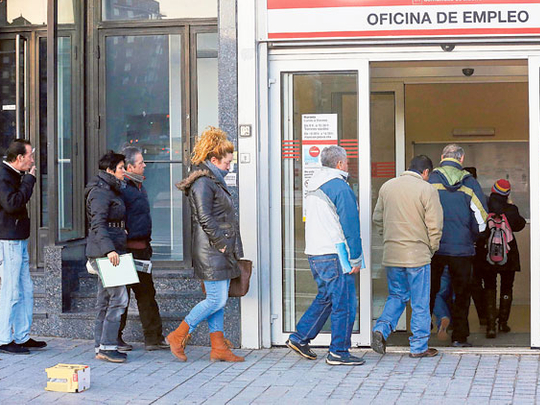
Brussels: Eurozone inflation fell to a two-year low in January as companies cut prices at a time of record joblessness, potentially giving the European Central Bank more scope to lower interest rates later this year.
Inflation in the 17 countries using the euro fell to 2 per cent in January compared to a year ago, the EU’s statistics office Eurostat said on Friday, its lowest level since November 2010 and well down from a 3 per cent peak in September 2011.
That puts the annual rate of increase in the cost of living just shy of the ECB’s target of close to, but below 2 per cent.
With Eurostat figures also showing Eurozone unemployment at a record 11.7 per cent of the working population in December, the ECB appears to have room to lower rates again to stimulate an economy that has slipped into its second recession since 2009.
“Inflation is non-existent,” said Thomas Costerg, an economist at Standard Chartered in London. “Now with German inflation decelerating, that will fuel debate about how the ECB will ease policy,” he said, forecasting a cut in the ECB’s main refinancing rate in the second quarter.
For the past year, inflation has been driven by oil prices and tax increases, but stripping out those factors, annual consumer price rises are around 1 per cent, reflecting the weakness of the economy.
The ECB’s governing council kept rates at 0.75 per cent at its January meeting and will discuss rate policy again on February 7. The decision to keep policy on hold was unanimous last month, but economists are still divided over the ECB’s future moves.
Rate cut
Thirty-eight out of 73 analysts polled in January by Reuters said the ECB will remain on hold in the first quarter. None expected a rate cut next week.
A stronger euro, which rose to a 14-month peak on Friday, could also dampen the export-led economic recovery and potentially support the case for a rate cut.
“You have to wonder whether this will lead to a reaction from the ECB next week,” said Nick Kounis, a senior economist at ABN AMRO in Amsterdam.
An third consecutive improvement in Eurozone business morale in January and better factory output suggest the bloc has passed the worst of its recession, however, meaning further ECB stimulus in the form of lower borrowing costs may not be needed.
The ECB’s task is also complicated by a divide between wealthier, northern countries which are showing signs of emerging from the Eurozone’s three-year-old debt crisis, and countries such as Spain and Italy that are in deep recession.
Stark differences between Eurozone countries’ ability to borrow also raises questions about the value of a rate cut. ECB President Mario Draghi said late last year that monetary policy is already “very accommodative.”
Growing job queues
The divergence in fortunes of Eurozone economies is evident not just in their ability to fund themselves, but in the rates of joblessness seen across the bloc of 330 million people.
Highlighting the human cost of a debt crisis that began in 2009 in Greece and spread to the Eurozone’s biggest economies, some 18.7 million people were out of work in December, an unemployment rate of 11.7 per cent. That figure has risen from below 8 per cent in early 2008, just before the full effects of the global financial crisis were fully felt, and is well above 11.3 per cent forecast by the European Commission for end-2012.
Unemployment held steady at just 5.3 per cent in Germany, the Eurozone’s biggest economy, however but rose again in Portugal and Cyprus, to 16.5 per cent and 14.7 per cent respectively.
Greece holds the record in both the Eurozone and the wider European Union for worklessness, with a rate of 26.8 per cent in October, the latest figure available. The unemployment rate in Spain fell slightly to 26.1 per cent in December.
Even as the economy appears to have hit bottom, the number of those out of work is expected to rise in coming months, employment expectations in the latest Commission survey suggest.
“We would still expect the jobless rate to breach 12 per cent later this year,” said Martin van Vliet, an economist at ING.












